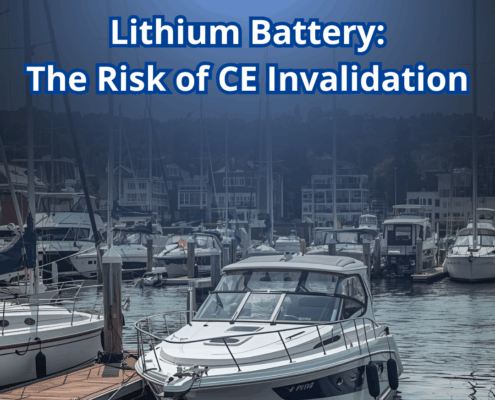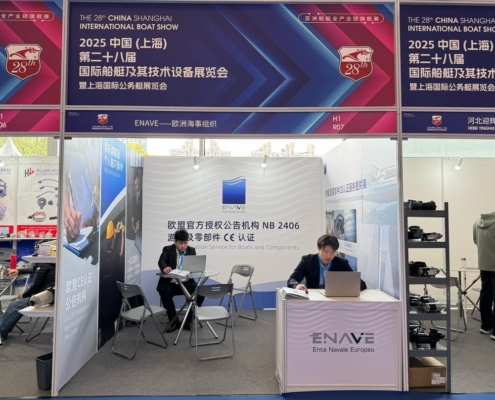Validity of CE Certification: The risk of CE invalidation following the installation of lithium batteries not foreseen by the shipyard
Replacing standard batteries with lithium-based battery packs is a modification that may be considered a “relevant modification” of the recreational craft (Article 3, point 7 of Directive 2013/53/EU).
According to Directive 2013/53/EU (RCD), anyone who modifies or causes a product already placed on the market to be modified in a way that may affect its compliance with the Directive’s requirements is considered a manufacturer and is subject to the obligations of a manufacturer. Therefore, the owner is responsible for this assessment and, in case of doubt about whether the modification constitutes a relevant modification, may consult a technician of their choice or a Notified Body to evaluate the impact of the specific modification on the Essential Requirements.
If the modification is deemed a “relevant modification”, the result may be that the recreational craft no longer meets the essential safety requirements, rendering the original Declaration of Conformity (DoC) invalid and consequently compromising the validity of the CE marking.
Post-Construction Assessment (PCA)
To restore compliance and maintain the validity of the CE certification, it is necessary to initiate the Post-Construction Assessment (PCA) procedure (Article 19 of Directive 2013/53/EU).
The PCA is the procedure outlined in Annex V of Directive 2013/53/EU. This procedure is required when the original manufacturer has not taken responsibility for the product’s compliance, and the individual or legal entity (e.g., the owner) who places the modified product on the market or puts it into service after the significant modification assumes responsibility for equivalent compliance.
The person requesting the PCA assumes exclusive responsibility for the product’s equivalent compliance with the applicable requirements of the Directive.
Safety Requirements
The modification of the power system with lithium batteries may require the Notified Body to verify compliance with specific safety requirements:
-
Design Requirements: The Notified Body will assess whether structural or weight changes (e.g., due to different battery placement) could negatively affect the vessel’s stability and buoyancy.
-
Fire Safety: The nature of lithium batteries introduces new considerations regarding fire and explosion risk prevention—an essential requirement for recreational craft.
-
Electrical System: Compatibility and safety of the existing electrical system with the new battery pack (often operating at different voltages and/or charging currents) must be demonstrated.
-
Technical Verifications: The Notified Body will carry out the necessary calculations, tests, and verifications to demonstrate compliance.
-
Risk Management: The installation of lithium batteries must be critically assessed for fire risk and the ability of the risk management system (by the builder or PCA applicant) to handle thermal runaway and other hazards specific to lithium cells.
If the modification is significant, the mere act of installing lithium batteries could potentially invalidate the existing CE certification, making the PCA process mandatory to restore compliance and ensure continued use of the vessel—both for administrative purposes (validity of the Safety Certificate for Italian-flagged vessels) and insurance coverage (which may be voided if the vessel is no longer CE marked due to modifications).
 https://www.enave.it/wp-content/uploads/2026/01/ENAVE-SHANGHAI.png
682
1030
enave
https://www.enave.it/wp-content/uploads/2016/10/LOGO-ENAVE-DEFINITIVO-verticale_RGB.png
enave2026-01-27 16:16:022026-01-27 16:25:42ENAVE: New Offices in Shanghai and Milan
https://www.enave.it/wp-content/uploads/2026/01/ENAVE-SHANGHAI.png
682
1030
enave
https://www.enave.it/wp-content/uploads/2016/10/LOGO-ENAVE-DEFINITIVO-verticale_RGB.png
enave2026-01-27 16:16:022026-01-27 16:25:42ENAVE: New Offices in Shanghai and Milan https://www.enave.it/wp-content/uploads/2025/10/Batterie-al-litio-Rischio-di-Decadenza-del-CE-1.png
1080
1080
enave
https://www.enave.it/wp-content/uploads/2016/10/LOGO-ENAVE-DEFINITIVO-verticale_RGB.png
enave2025-10-21 10:30:162025-10-27 15:24:39Lithium Battery: The Risk of CE Invalidation
https://www.enave.it/wp-content/uploads/2025/10/Batterie-al-litio-Rischio-di-Decadenza-del-CE-1.png
1080
1080
enave
https://www.enave.it/wp-content/uploads/2016/10/LOGO-ENAVE-DEFINITIVO-verticale_RGB.png
enave2025-10-21 10:30:162025-10-27 15:24:39Lithium Battery: The Risk of CE Invalidation https://www.enave.it/wp-content/uploads/2025/09/SN65_250919ap_00275-scaled.jpg
1708
2560
enave
https://www.enave.it/wp-content/uploads/2016/10/LOGO-ENAVE-DEFINITIVO-verticale_RGB.png
enave2025-09-23 14:46:562025-10-27 15:35:25AI in Nautics
https://www.enave.it/wp-content/uploads/2025/09/SN65_250919ap_00275-scaled.jpg
1708
2560
enave
https://www.enave.it/wp-content/uploads/2016/10/LOGO-ENAVE-DEFINITIVO-verticale_RGB.png
enave2025-09-23 14:46:562025-10-27 15:35:25AI in Nautics https://www.enave.it/wp-content/uploads/2025/05/02616ce8-5f8f-4ce8-88bb-9de838f283fd.jpg
968
1006
enave
https://www.enave.it/wp-content/uploads/2016/10/LOGO-ENAVE-DEFINITIVO-verticale_RGB.png
enave2025-05-13 11:54:122025-10-27 15:37:34PRESS RELEASE: Strategic Agreement ENAVE – WANVE
https://www.enave.it/wp-content/uploads/2025/05/02616ce8-5f8f-4ce8-88bb-9de838f283fd.jpg
968
1006
enave
https://www.enave.it/wp-content/uploads/2016/10/LOGO-ENAVE-DEFINITIVO-verticale_RGB.png
enave2025-05-13 11:54:122025-10-27 15:37:34PRESS RELEASE: Strategic Agreement ENAVE – WANVE https://www.enave.it/wp-content/uploads/2025/04/WhatsApp-Image-2025-04-02-at-08.44.10-2.jpeg
809
1080
enave
https://www.enave.it/wp-content/uploads/2016/10/LOGO-ENAVE-DEFINITIVO-verticale_RGB.png
enave2025-04-15 12:46:202025-04-15 12:48:33ENAVE at the China International Boat Show 2025
https://www.enave.it/wp-content/uploads/2025/04/WhatsApp-Image-2025-04-02-at-08.44.10-2.jpeg
809
1080
enave
https://www.enave.it/wp-content/uploads/2016/10/LOGO-ENAVE-DEFINITIVO-verticale_RGB.png
enave2025-04-15 12:46:202025-04-15 12:48:33ENAVE at the China International Boat Show 2025 https://www.enave.it/wp-content/uploads/2024/09/INDUSTRIAL-ENGINEERING.png
1080
1080
enave
https://www.enave.it/wp-content/uploads/2016/10/LOGO-ENAVE-DEFINITIVO-verticale_RGB.png
enave2024-10-23 11:45:272025-10-27 15:36:48ENAVE – Industrial Engineering
https://www.enave.it/wp-content/uploads/2024/09/INDUSTRIAL-ENGINEERING.png
1080
1080
enave
https://www.enave.it/wp-content/uploads/2016/10/LOGO-ENAVE-DEFINITIVO-verticale_RGB.png
enave2024-10-23 11:45:272025-10-27 15:36:48ENAVE – Industrial Engineering https://www.enave.it/wp-content/uploads/2024/09/ingresso-salone.jpg
960
1280
enave
https://www.enave.it/wp-content/uploads/2016/10/LOGO-ENAVE-DEFINITIVO-verticale_RGB.png
enave2024-10-08 11:58:342024-10-08 12:06:13Genoa Boat Show 2024 – ENAVE
https://www.enave.it/wp-content/uploads/2024/09/ingresso-salone.jpg
960
1280
enave
https://www.enave.it/wp-content/uploads/2016/10/LOGO-ENAVE-DEFINITIVO-verticale_RGB.png
enave2024-10-08 11:58:342024-10-08 12:06:13Genoa Boat Show 2024 – ENAVE https://www.enave.it/wp-content/uploads/2024/07/Progetto-senza-titolo-24.png
1080
1080
enave
https://www.enave.it/wp-content/uploads/2016/10/LOGO-ENAVE-DEFINITIVO-verticale_RGB.png
enave2024-07-12 11:13:462024-07-12 11:13:46Sulla zattera verso Itaca
https://www.enave.it/wp-content/uploads/2024/07/Progetto-senza-titolo-24.png
1080
1080
enave
https://www.enave.it/wp-content/uploads/2016/10/LOGO-ENAVE-DEFINITIVO-verticale_RGB.png
enave2024-07-12 11:13:462024-07-12 11:13:46Sulla zattera verso Itaca https://www.enave.it/wp-content/uploads/2024/07/COPERTINA-BREAKING-NEWS.png
1080
1920
enave
https://www.enave.it/wp-content/uploads/2016/10/LOGO-ENAVE-DEFINITIVO-verticale_RGB.png
enave2024-07-05 09:54:322024-07-05 10:02:08La Vela che Unisce
https://www.enave.it/wp-content/uploads/2024/07/COPERTINA-BREAKING-NEWS.png
1080
1920
enave
https://www.enave.it/wp-content/uploads/2016/10/LOGO-ENAVE-DEFINITIVO-verticale_RGB.png
enave2024-07-05 09:54:322024-07-05 10:02:08La Vela che Unisce


